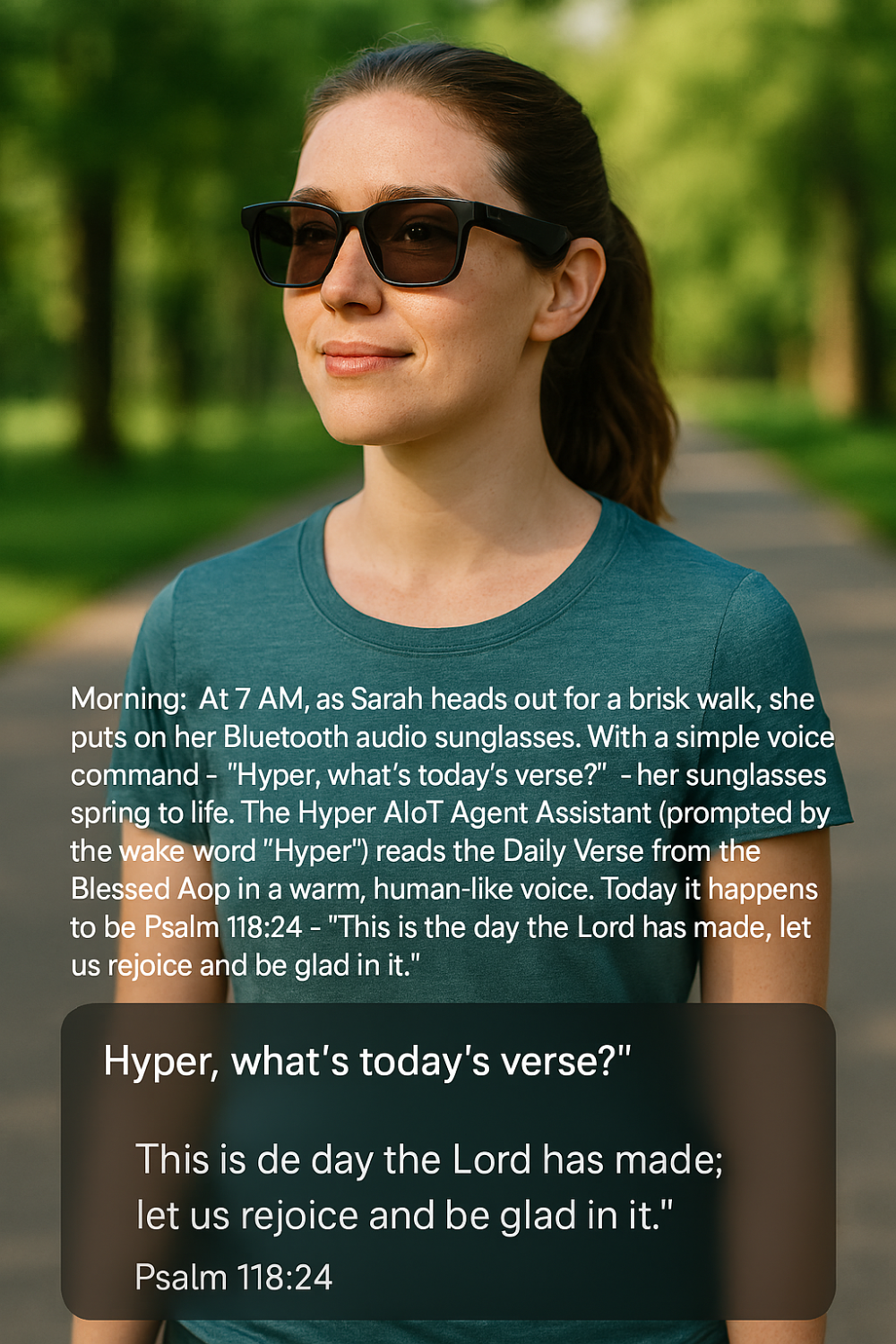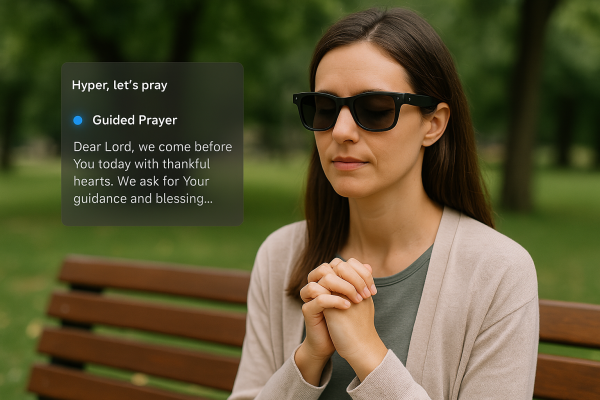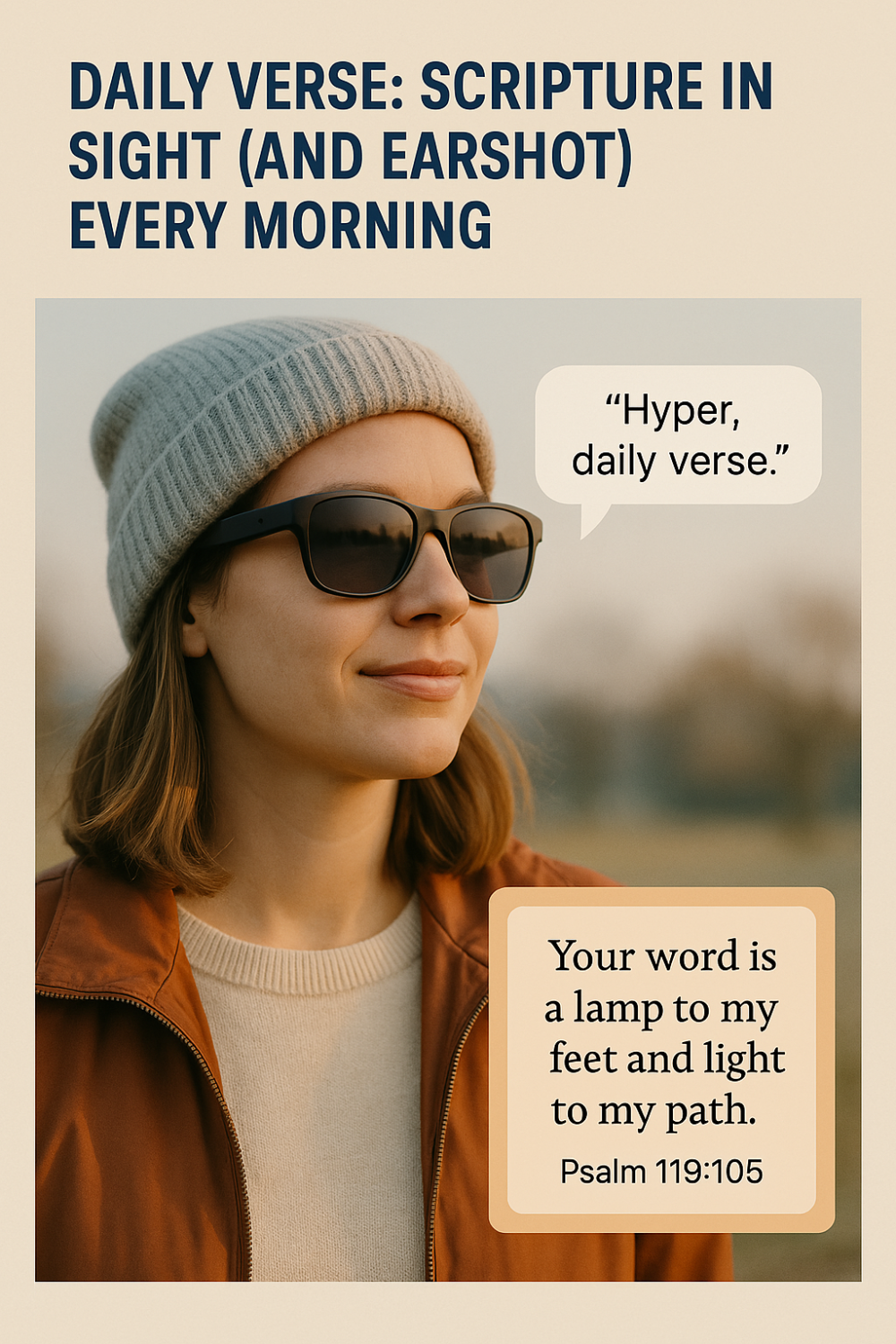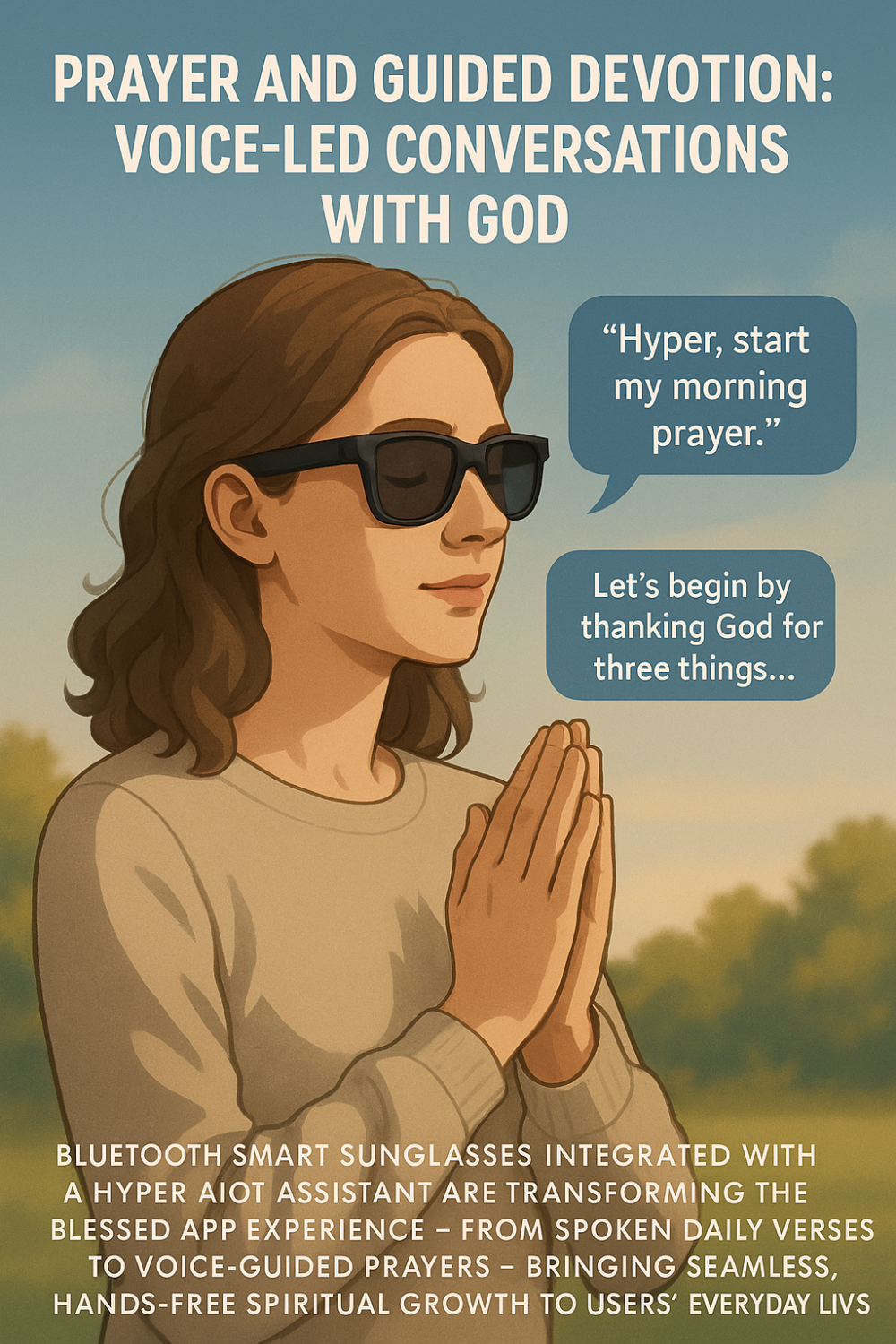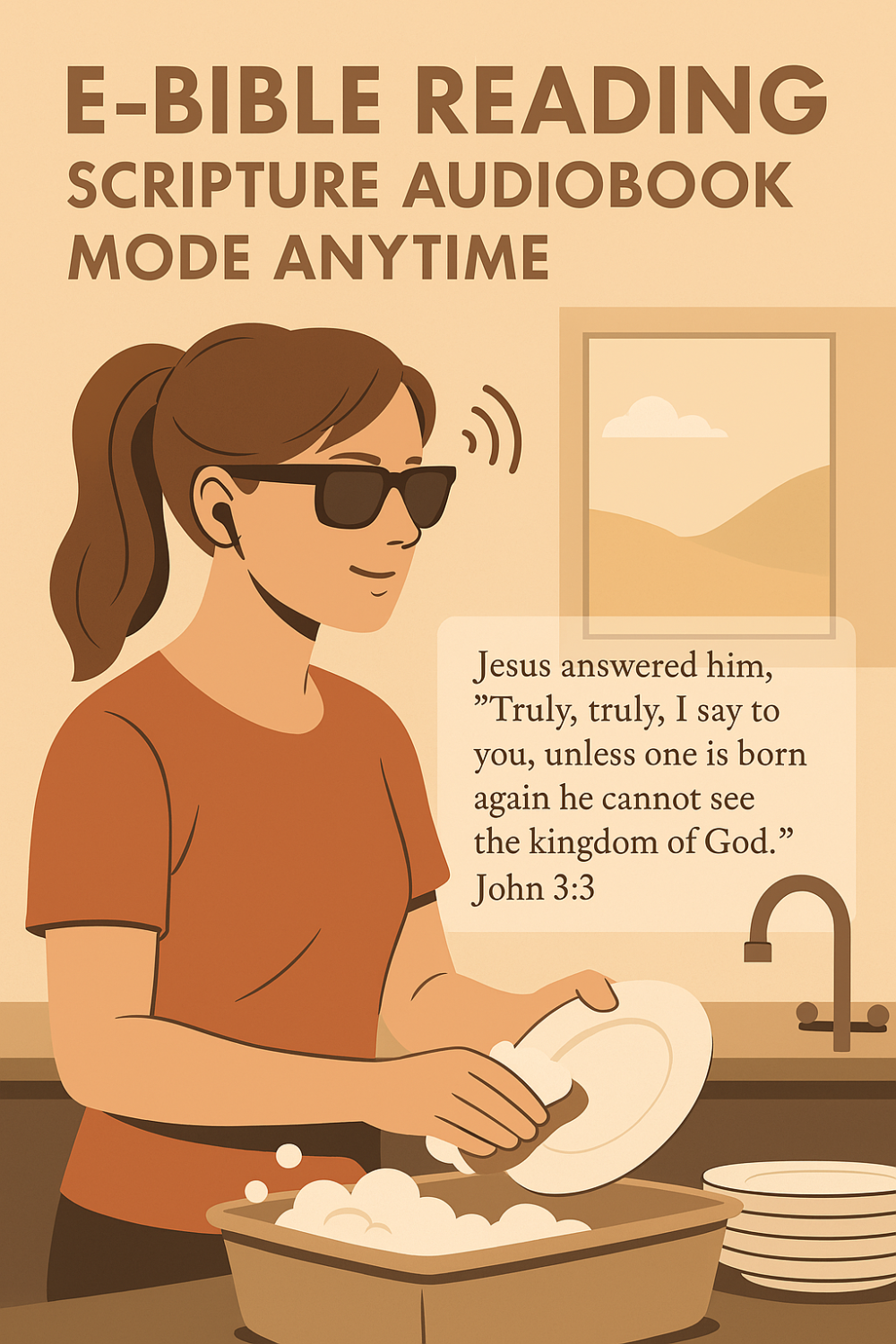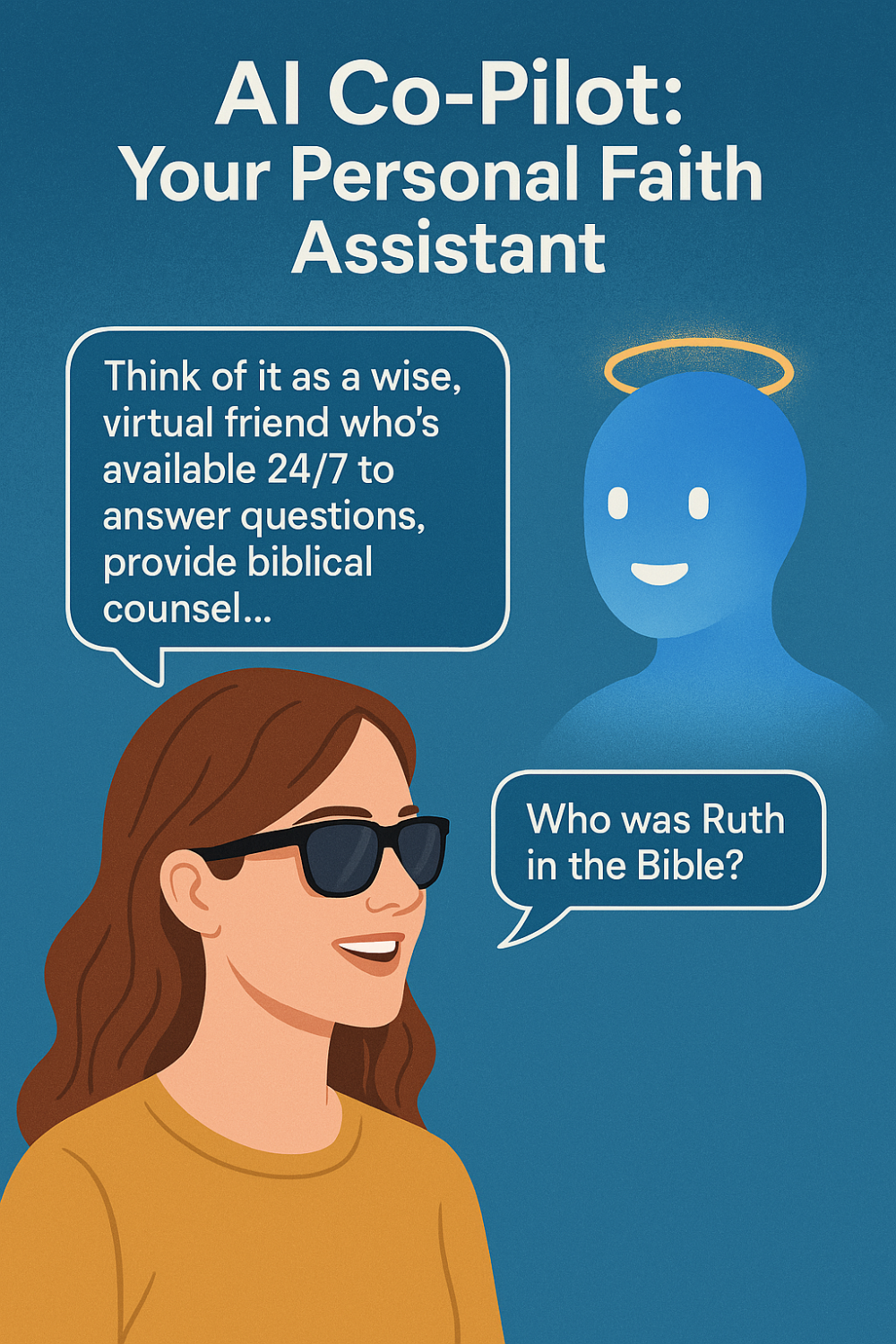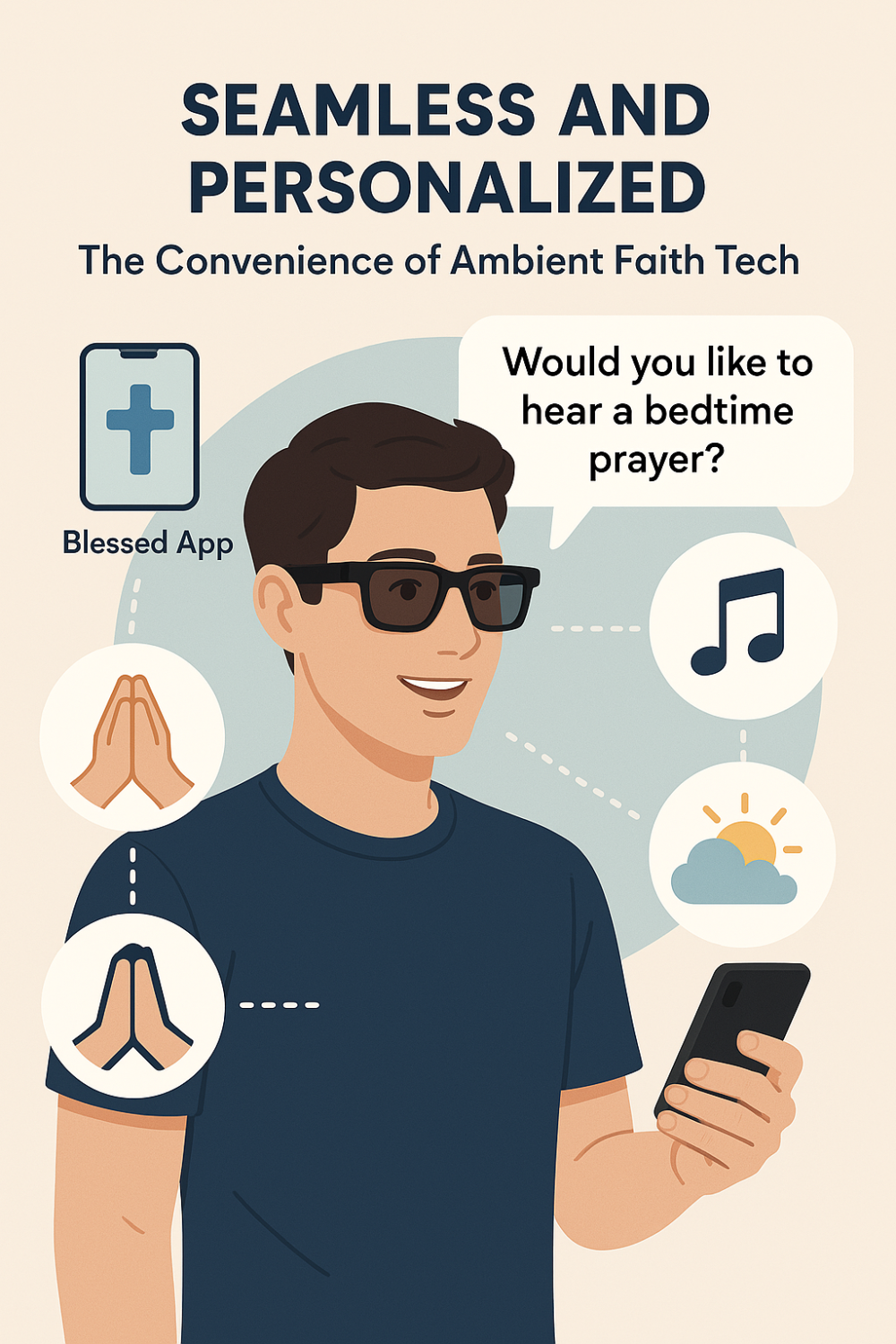How Bluetooth Sunglasses with Hyper AIoT Agent Assistant Elevate the Blessed App Experience

Discover how Bluetooth smart sunglasses integrated with a Hyper AIoT agent assistant are transforming the Blessed App experience – from spoken daily verses to voice-guided prayers – bringing seamless, hands-free spiritual growth to users’ everyday lives.
The Intersection of High-Tech and Spirituality: Bluetooth Smart Sunglasses and AI-Powered Faith
In a world where technology pervades every aspect of life, it was only a matter of time before our spiritual lives got a high-tech upgrade. Wearable gadgets have already changed how we work out, communicate, and consume media – why not how we pray and reflect?
Enter the unlikely duo of Bluetooth smart sunglasses and the Hyper AIoT Agent Assistant, now integrated with the popular Blessed App. This fusion of cutting-edge AIoT (AI + Internet of Things) and faith-based mobile experience is redefining hands-free spiritual engagement.
Faith-focused AI tools are on the rise – one report notes an interactive AI Bible Chat in a devotional app is growing usage by 50% month-over-month – and Blessed App is riding that wave of innovation. By pairing smart audio sunglasses with a voice-controlled AI assistant, Blessed App’s features (daily verse, guided prayer, E-Bible, “Healing Room” community, and AI co-pilot) can now be experienced seamlessly on the go. The result? A new kind of wearable ministry that feels like TechCrunch-level innovation: high-end tech merging with timeless spirituality.
Case Story: A Day in the Life of a Hands-Free Devotee
Meet Sarah – a busy project manager, mother of two, and a devoted member of her church community. Her day is a juggling act of morning school drop-offs, client meetings, and errands. Finding quiet time for Scripture and prayer used to be a challenge. Sarah often felt guilty for scrolling on her phone to open her Bible app, only to get sidetracked by emails. That all changed when she discovered that her stylish Bluetooth sunglasses could double as a voice-activated spiritual assistant with the Blessed App and Hyper AIoT Agent.
Morning:
At 7 AM, as Sarah heads out for a brisk walk, she puts on her Bluetooth audio sunglasses. With a simple voice command – “Hyper, what’s today’s verse?” – her sunglasses spring to life. The Hyper AIoT Agent Assistant (prompted by the wake word "Hyper") reads the Daily Verse from the Blessed App in a warm, human-like voice. Today it happens to be Psalm 118:24 – “This is the day the Lord has made; let us rejoice and be glad in it.”
The verse echoes in her ears as sunlight filters through her lenses. She smiles, already feeling grounded. As she walks, the assistant shares a brief devotional commentary on the verse, just like the Blessed App’s daily devotionals would on screen, but now completely hands-free. Sarah finds herself not just exercising her body but also lifting her spirit, without ever glancing at a phone.
Midday: Later, between meetings, Sarah sits in a park to recharge. She whispers, “Hyper, let’s pray.” Immediately, the assistant launches into a guided prayer from Blessed App’s vast collection of personalized prayer prompts. With her eyes closed behind the shades, Sarah follows along in prayer, responding quietly. It feels like having a personal chaplain by her side. At one point she adds her own prayer request: “...and bless my colleague who is struggling today.” The built-in mics in her glasses pick up her voice, and the AI co-pilot gently responds with a relevant Bible promise of comfort, turning this moment into an interactive prayer session. What was once a quick lunch break has become a mini spiritual retreat – no tapping, swiping, or reading required.
Evening: After dinner, once the kids are in bed, Sarah tackles some chores. She puts on her glasses again while folding laundry. “Hyper, play the Gospel of John, chapter 1,” she says. The assistant promptly starts reading Scripture aloud – effectively turning her eyewear into an audiobook Bible. For the next 20 minutes, her living room is filled with the calming narration of the E-Bible. As she moves about, she occasionally asks the AI co-pilot for clarification: “Hyper, what did John mean by ‘the Word’?” The assistant pulls from its knowledge (powered by a biblical AI, much like Blessed’s Bible Chat feature) and gives a brief explanation referencing commentary. It’s as if Sarah has a Bible scholar on call, right in her ear. By the time she finishes her chores, her heart and mind are nourished by the Word, all without having had to sit down with a book or screen.
To wind down the day, Sarah decides to drop into the Blessed App’s community Healing Room. This is a live audio chatroom where people share prayers and encouragement – a virtual support fellowship. Instead of staring at her phone, she simply says, “Hyper, join the Healing Room.” Instantly, she hears the gentle voices of the community through her glasses. One member is sharing a testimony of healing; another is asking for prayer. As names and comments scroll by on others’ screens, Sarah’s AI assistant softly speaks their words to her, almost like an audiobook of a chat. Inspired, Sarah decides to contribute. “Hyper, record a message: I’m praying for you all, and I believe God is with us tonight,” she speaks. The assistant transcribes and posts her encouragement into the chat. Even though she’s tidying up the kitchen, Sarah is fully present in that spiritual discussion – no hands, no phone, just heart. When a closing prayer begins, she bows her head, still wearing the glasses, and prays along. By 10 PM, when she finally takes the glasses off, she realizes that technology has woven prayer, scripture, and community into every part of her day in a truly effortless way.
Sarah’s story might sound futuristic, but it’s becoming reality. What was once a mere pair of sunglasses has transformed into a personal spiritual companion, thanks to the Hyper AIoT Agent Assistant. Her daily routine is still hectic, but now God’s word and presence feel closer than ever, seamlessly integrated into life’s every moment. This case illustrates the power of this innovation: it augments human faith practice with AI-driven convenience, allowing users like Sarah to “pray without ceasing” in a modern, hands-free fashion.
Blessed App’s Features, Supercharged by Wearable AI
The Blessed App itself is already a rich digital faith platform. “Blessed is a Christian app designed to support your spiritual journey,” the company explains on its site, bringing together daily verses, Bible reading, guided prayers, and inspiring content alongside community tools. Now, by integrating with a Hyper AIoT voice assistant and smart glasses, each of Blessed’s key features gets supercharged – accessible anytime, anywhere, with simple voice commands. Let’s break down how this combo enhances those features:
Daily Verse: Scripture in Sight (and Earshot) Every Morning
Many believers start their day with a daily Bible verse, and Blessed App’s home screen prominently features one each day to meditate on. Traditionally, you’d read it on your phone or get a notification. With AIoT-enabled sunglasses, that daily verse truly goes mobile in a whole new way. Imagine your morning routine: you step outside with your coffee, say “Hyper, daily verse,” and instantly hear the verse of the day along with a short reflection. This hands-free scripture delivery means you can absorb God’s Word while walking the dog, driving, or watching a sunrise – moments where pulling out a phone might not be convenient (or safe). The Blessed App’s content is optimized to be brief but impactful, perfect for an audio snippet.
This approach also helps users focus on the verse without the usual smartphone distractions. There’s no temptation to swipe to other apps; the verse comes through cleanly via audio. The Blessed App team markets their product as “a space to find encouragement and deepen your faith” – and having the verse literally spoken into your day furthers that mission. You gain encouragement through hearing, engaging multiple senses. It’s well known that listening to scripture can sometimes make it resonate differently than reading it. In fact, many people find hearing the Bible brings new understanding or focus they miss with silent reading. With smart glasses, you get that benefit on-demand.
Crucially, this is completely hands- and eyes-free – you could be brewing your morning tea or jogging, and still receive daily bread for your soul. It’s a bit like having a daily devotional podcast, except it’s one you trigger anytime and can pause to reflect or repeat. The Hyper AIoT Assistant can even be programmed to automatically read the verse at a set time each day (say, 7 AM as you leave the house), acting as an alarm clock for your spirit. By making the Verse of the Day so accessible, the integration helps users consistently remember and apply scripture. As Psalm 119 says, “I have hidden your word in my heart…” – and now you can literally wear it in your ears.
Prayer and Guided Devotion: Voice-Led Conversations with God
Prayer is at the heart of the Blessed App experience. The app provides personalized prayer guides and even records of your prayers to help you track your spiritual journey. With the Hyper AIoT glasses setup, these prayer features move from screen to spoken word. This is transformative for those who find it hard to carve out quiet prayer time or who struggle with focus.
Using voice activation, you can start a guided prayer session anytime, anywhere. Perhaps you’re on a quiet nature trail – you say, “Hyper, start my morning prayer.” The AI assistant might respond with a gentle prompt like, “Let’s begin by thanking God for three things…” and then pause, giving you time to speak or reflect. It can then continue with the next segment of a guided prayer, drawn from Blessed’s library of prayer content. Because the AIoT Assistant is essentially an extension of the app, it knows what prayers or devotionals you like. It could even adjust on the fly: if you’re audibly emotional or anxious, perhaps it offers a calming prayer or a reminder from scripture to ease your mind.
An exciting aspect here is two-way interaction. Traditional guided prayers (like those in many meditation apps or audio guides) are one-way — you listen and pray silently. But the Hyper AI assistant can listen for your voice too. If you choose, you can pray out loud, and it can react. For instance, you might say, “Lord, give me strength today...” and the assistant might softly interject with a relevant Bible promise, like “Fear not, for I am with you – Isaiah 41:10,” reinforcing your prayer with scripture. It’s almost like praying with a partner who knows the Bible by heart. (Importantly, this happens locally via your phone’s AI app – so it’s private. The assistant isn’t broadcasting your prayers to some cloud audience; it’s more akin to how Alexa or Siri processes voice commands with privacy measures in place.)
Another benefit is continuity. Say you usually use Blessed App’s text-based prayer guides at night before bed. If you didn’t get to it, you can now utilize your commute home. Driving with your glasses on, you could speak “Hyper, open my evening prayer guide” and have the prayer read to you line by line as you focus on the road. You can respond or just meditate on the words. The AI can even prompt you to breathe and relax as you pray, functioning similar to mindfulness apps but with a spiritual twist tailored to Christian prayer.
For those unsure what or how to pray, this system is a game-changer. It essentially serves as a prayer coach. New to praying aloud? The voice assistant’s prompts and responses gently teach you. Feeling shy to pray in a group? Practicing with the AI in your private moments can build confidence. Struggling with what to say? The Blessed App’s prayer texts, delivered in a soothing voice, ensure you’re never at a loss. The result is that prayer becomes more approachable and integrated into daily life – not just a solitary activity when you have quiet time to read off a screen.
E-Bible Reading: Scripture Audiobook Mode Anytime
The Bible is a big book (or rather, library of books), and many users turn to Blessed App for Bible reading plans and verses by topic. Traditionally, that means reading on the phone or listening to audio Bible files. With Bluetooth sunglasses + AI assistant, your glasses become your Bible narrator. This goes beyond just playing an audio file – because the AI can intelligently navigate and even explain the text.
Consider how flexible this setup is. You could ask, “Hyper, read John chapter 3, verses 1 through 10.” The assistant will fetch the exact passage (Blessed App offers multiple Bible translations, so perhaps it asks if you have a preferred translation like NIV or KJV) and then read it aloud. If you miss something, you can say “repeat verse 5” and it will instantly comply. Want to switch to a different translation to compare wording? Just ask. This kind of dynamic, voice-controlled scripture engagement feels very futuristic for Bible study – no more manual searching or tapping tiny verse links.
What if you want to reflect on scripture or ensure you understood it correctly? That’s where the AI co-pilot aspect shines (more on the co-pilot in its own section below). For example, after hearing John 3:1-10, you can ask, “Hyper, what’s the main lesson from that story?” The assistant, drawing on its language model trained in biblical knowledge, might summarize: “This passage covers Jesus explaining the concept of being ‘born again’ to Nicodemus, teaching that spiritual rebirth through faith is necessary to see God’s kingdom.” It might even quote the famous John 3:16 a bit later as context. In essence, it can act like a study Bible note or commentary – all via voice. This turns a routine chore, like doing dishes (as in Sarah’s case), into an impromptu Bible study session.
Another compelling use-case is Bible listening during routine activities. Many people already play audio Bibles during their commute or workout. However, the integration with Hyper AIoT makes it more interactive. If something you hear sparks a thought, you can pause and discuss it with the AI: “Hyper, what does that word mean in Hebrew?” or “Hyper, how does this relate to yesterday’s verse?” The agent can handle many such queries, acting as a Bible co-pilot/teacher rather than a passive audio track. It’s like having a theologian on call. (Of course, it has its limits and isn’t a substitute for human pastors or scholars, but for quick info and context, it’s brilliant.)
One might worry about the sanctity of scripture being read by a synthetic voice. The good news is text-to-speech technology is highly advanced now – the voice reading to you can be pleasant and emotive. You might even have options for voice type (perhaps a calm female voice, or a baritone male voice, etc., to suit your preference, much like choosing a narrator for an audiobook). The convenience of having the entire Bible accessible via a spoken command cannot be overstated. It lowers barriers to engaging with scripture. Stuck in traffic? Turn that idle time into Bible time. Eyes too tired to read at night? Let the glasses gently speak God’s word to you as you drift to sleep (maybe the assistant can even be set to stop after a set time or at the end of a chapter – a “Bible bedtime mode”).
The Blessed App already “enhances your Bible reading experience with powerful features” in the mobile app. Now, with wearable integration, it extends those features beyond the screen. You’re not limited to when you can hold your phone. The E-Bible is effectively walking with you, just as the scripture says “bind them on your hearts” – here you are, figuratively binding scripture to your daily activities through technology.
Healing Room & Community: Always-On Fellowship and Support
One of the standout aspects of Blessed App is its community features – notably the “Healing Room” or healing chatroom where users can find comfort and pray for one another. This taps into a big need: fellowship and support, especially for those who may not have a local group readily available at all times. With the AIoT glasses, participating in these live spiritual communities becomes incredibly convenient and immersive.
Instead of typing out messages or reading through long chat threads on your phone, you can let the assistant do the heavy lifting. For instance, if there’s a live audio prayer session or a text chat ongoing, the assistant can narrate it for you. You might say, “Hyper, open the Healing Room.” The agent could respond with a summary: “10 people are in the Healing Room. Jane: asking for prayers for her health. Michael: sharing a praise report about a new job…” This quick spoken brief already connects you to what’s happening. You can then dive in further: “Read what John posted.” It will speak John’s longer message of encouragement. In effect, you’re listening to a support group in real-time.
It gets better – you can speak back your contributions. “Hyper, I’d like to pray for Jane.” The assistant can either transcribe your spoken prayer into the chat for others to read, or if the platform supports live audio participation, unmute you to speak directly. Considering privacy and context, it might even offer to disguise your voice if you’re shy (though that might be overkill; most will just speak normally). The main point is you remain hands-free and present, perhaps kneeling in prayer or continuing your task, while engaging with a community of believers.
The spiritual empowerment here is notable. Many people find strength in communal prayer and real-time encouragement. By making it accessible through wearables, you effectively carry a pocket congregation with you. Feeling anxious before a doctor’s appointment? Listen in to a Healing Room session for comfort in the waiting room, no fumbling with a phone. Working late and missing your usual Bible study group? Pop on the glasses and see if someone is in the chatroom to discuss a verse or pray together, all while you finish paperwork. It breaks down the barrier of physical location while also freeing you from being tethered to a screen.
Moderation and safety in these spaces can also be enhanced by AI. The Hyper assistant could monitor conversations for inappropriate content or someone in crisis, and alert community moderators or gently intervene with an encouraging scripture. This ensures the Healing Room remains a wholesome environment aligned with the app’s faith-centric values.
Another subtle but powerful benefit: anonymity with presence. Some users might be hesitant to actively participate in religious forums. With the AI reading things out, you can lurk and absorb without anyone knowing you’re there until you’re ready. It’s a way to receive ministry without the pressure of typing a perfect message. And when you are ready to contribute, just speak from the heart – the AI will handle the rest.
In short, integrating Blessed’s community features with wearable AI makes the global church feel a little closer. It exemplifies Blessed App’s mission of “connecting Christians worldwide through an online community, fostering their faith with technology”. Now that community is in your ear, on-demand, ready to uplift or be uplifted by you.
AI Co-Pilot: Your Personal Faith Assistant
Perhaps the most intriguing feature of this whole setup is the AI co-pilot – essentially, an AI persona that accompanies the user through the Blessed App. Think of it as a wise, virtual friend who’s available 24/7 to answer questions, provide biblical counsel, and even learn your preferences to better support your faith journey. Blessed App’s Bible Chat feature is essentially this co-pilot on the app, described as an interactive Bible assistant powered by ChatGPT. With the Hyper AIoT integration, that assistant steps out of the chat box and into real life via your smart glasses.
Using the co-pilot is as simple as talking. You might ask casual, spontaneous questions as you go about your day. “Hyper, what does ‘meek shall inherit the earth’ really mean?” or “Hyper, I’m feeling really discouraged – can you share an inspiring verse?” Because the AI is conversational, it will respond in a thoughtful, context-aware manner. It might explain the Beatitudes in plain language and then encourage you with a related verse or a brief prayer. Unlike a human companion, you don’t have to worry about bothering it – it’s literally built to help whenever needed.
The AI’s knowledge is vast (though not infallible). It has been trained on scripture and Christian teachings, so it can often cite verses or stories relevant to your query. For example, if you ask, “Who was Ruth in the Bible?” it will give you a succinct summary of Ruth’s story and why it matters. If you ask a tougher theological question, it will attempt a balanced answer and even admit if something is beyond its scope, perhaps advising you to consult a pastor for deeper insight – a humble AI, imagine that!
Because this co-pilot is in your ear, it feels very much like a natural conversation. Early users have described it as having a spiritual mentor on demand. Walking into a stressful meeting, you might quietly ask, “Hyper, pray for me right now.” The AI can whisper a personalized prayer asking God to give you wisdom and peace. Sitting in traffic angry, you could mutter, “I’m so frustrated at the driver who cut me off.” The AI might gently remind you of “a soft answer turns away wrath” or “forgive as the Lord forgave you,” acting as that little nudge to keep your cool. It’s surprisingly comforting – and a bit uncanny – how it can feel like the AI knows you. In reality, it’s drawing on patterns (perhaps it knows you often get anxious on Monday mornings and proactively offers a specific prayer or song if it detects you’re unusually silent). This is the promise of AI personalization in a faith context.
Security and doctrinal soundness are important here. Users and church leaders might rightly ask: can an AI be trusted for spiritual advice? The Blessed App likely has safeguards – for instance, the AI’s knowledge base is tuned to mainstream Christian doctrine and it might avoid delving into contentious theological debates. It’s an assistant, not a prophet. Ideally, it cites Bible verses or recognized Christian writings instead of just spouting opinions. In fact, because it’s digital, it can often provide an exact chapter:verse reference for everything it says (“Romans 8:28 – all things work together for good…” etc.), encouraging users to verify and read further if they want. This transparency helps maintain trust. Users are encouraged to use the AI as a supplement to, not a replacement for, human mentorship and personal Bible study. When used appropriately, it’s a powerful tool – like a concordance, devotional, and prayer partner merged into one, always accessible through a simple voice query.
Consider one more scenario: journaling and self-reflection. Some nights you might speak to the AI about your day: “I felt jealous of my friend today. I know it’s wrong.” The co-pilot can respond like a gentle counselor, reminding you of God’s love and perhaps prompting you to pray about it or recall a lesson from a recent sermon. Over time, it could even remind you of progress: “You mentioned envy a few times last month, but remember how you helped your friend wholeheartedly this week? You’re growing!” This kind of personalized feedback, even if from an algorithm, could greatly encourage users to keep pursuing growth in character.
The AI co-pilot truly embodies the idea of an ever-present help (echoing Psalm 46:1 in a high-tech way). By integrating it with something as wearable as sunglasses, it becomes ubiquitous but not intrusive. You don’t have to schedule a chat or stare at a screen – just speak and listen as naturally as talking to yourself. In a sense, it externalizes that inner dialogue of prayer and contemplation, giving you something/someone to interact with. For many, that makes all the difference in staying consistent and intentional in their walk of faith.
Prayer on the Move: Outdoor Devotion and Meditation Anywhere
One of the joys of wearable tech is that it untethers us from desks and couches. The combination of smart sunglasses and Blessed’s content means you can take your devotional life into the great outdoors. Whether it’s a hike, a morning jog, or just sitting in a park, you can engage in outdoor prayer and meditation more deeply with this technology.
Imagine taking a hike up a hill at dawn. In the past, you might carry a small devotional book or have your phone read a Psalm – but fiddling with devices can pull you out of the moment. Now, wearing your AIoT shades, you can simply say, “Hyper, let's do a nature meditation.” The assistant could play ambient sounds of gentle worship music or simply use the real sounds around you picked up by the glasses’ mics, and then lead you through a guided meditation on creation. It might quote, “The heavens declare the glory of God – Psalm 19:1,” and prompt you to observe the sky and give thanks. Then it could fall silent for a few minutes as you walk and pray, and later gently bring your focus back with another prompt or verse. You are fully heads-up, noticing the beauty around you, while the AI keeps you anchored spiritually. This synergy of nature and tech-driven meditation could make prayer walks profoundly richer.
Even mainstream smart glasses companies see the appeal of wellness content in outdoor settings. Meta’s Ray-Ban smart glasses, for instance, added integration with the Calm meditation app, allowing users to simply say "play the Daily Calm" to get mindfulness sessions through their glasses. If secular meditation can be done through wearables, why not sacred meditation? Blessed App could offer “Daily Selah” (to borrow the Psalmist’s term) – short guided pauses for reflection that the AI can recite at intervals during your walk or run. Runners might love a feature where every mile, the assistant shares a new inspirational quote or short prayer, turning a workout into a moving prayer experience.
Safety and situational awareness during outdoor prayer are also improved by this method. Unlike noise-cancelling earbuds, open-ear audio glasses let you hear traffic, birds, people – your environment – while still hearing the content. So you can walk city streets praying with your eyes open, listening to scripture, yet still notice a car horn or someone greeting you. Your posture is naturally more open and engaged with the world (not hunched over a phone). Some might worry that talking to an AI while walking looks odd – but voice assistants have become common. It’s no weirder than someone speaking into AirPods. And you can always mute the mic and have it just play audio if you’re in a public space and prefer silent participation (praying in your heart along with the audio).
For those who do outdoor meditation at places like the beach or a garden, the glasses could also provide background music or sounds of nature accompanying a spoken devotional. The advantage over a phone speaker is the sound is right by your ears, less likely to disturb others and more immersive for you. Also, no bright screens to kill your night vision if you’re stargazing and meditating on the Psalm 8 (“When I consider your heavens, the work of your fingers, the moon and the stars…”). It’s just you, the voice, and the stars – quite a heavenly combo.
This all contributes to what we might call ambient spirituality – your spiritual practices flow with wherever you are, not confined to a chapel or a quiet corner at home. The technology allows God’s Word and presence to meet you on the jogging trail, on the mountain, in the backyard. For modern believers who find God in nature as much as in church, this is a beautiful development. It fulfills, in a high-tech way, the old practice of taking a prayer walk – now with a guide in your ear and no logistical hassle. As long as your sunglasses have battery, you have a companion for your soul. And given many smart glasses can run 4-6 hours of continuous audio on a charge, you’re covered for even the longest contemplative strolls.
Worship While You Work: Sanctifying Daily Chores and Routines
Not all of life’s moments are picturesque walks in the park. A lot of our time is spent on mundane chores and routines – cleaning the house, cooking, commuting in traffic, doing grocery shopping, etc. These often feel like “dead time” for the mind, but with the right approach they can become opportunities to connect with God. This is exactly what integrating Blessed App with a hyper AI assistant enables – turning everyday tasks into moments of worship or learning. It’s about infusing the holy into the humdrum.
Consider how many hours a week you might spend on chores. Now imagine redeeming even a fraction of that time for spiritual growth. With your AIoT sunglasses on, you could be vacuuming and simultaneously listening to a devotional podcast or a Bible study via the Blessed App’s content library. You don’t have to worry about dropping your phone in a bucket or getting it dirty with flour while baking – the glasses stay on your face, out of the way, and yet deliver rich content to your ears. You can even control playback by voice: “pause” when the blender is on, “resume” when it’s done, “next” if a particular teaching isn’t resonating with you.
Better yet, you can actively engage with content. Suppose you’re preparing dinner and the assistant is reading a chapter from a Christian book or maybe narrating a story from the Bible. You have a thought or question – normally you’d have to dry your hands and type it out or just shelve it for later. Now you can ask immediately, in natural language. “Hyper, what did the pastor mean by that last point?” and it might pull up a quick explanation or an FAQ if it’s a recorded sermon with known common questions. If you’re memorizing verses as you cook (some people do tape verses on the wall – this is the audio equivalent), you can have the AI quiz you: “I’ll recite a verse with a word missing, you fill the blank.” It turns routine tasks into an interactive devotional game!
During commutes, this technology shines as well. Commuting often feels like lost time, but many turn on Christian radio or playlists to uplift their mood. With the Hyper AI assistant, you get far more control and variety than radio. Feeling stressed in bumper-to-bumper traffic? Say “Hyper, play a worship playlist.” Uplifting music will play through your glasses’ speakers (which are right by your ears but don’t block outside sound – crucial for driving safety). Need to make use of the time to catch up on a sermon or a Christian audiobook? Just request it. If you recall that Sunday’s sermon had a live Q&A but you missed it, you could even have the AI read the Q&A transcript or summary from your church’s site. All without taking your eyes off the road. In fact, this setup is arguably safer than fiddling with the car radio or a touchscreen, since voice command is the primary interface.
Even errands like shopping can have a spiritual twist. While pushing your cart, you could quietly listen to a rosary prayer (if Catholic) or a scripture lullaby or a theological debate – whatever edifies you. Mundane tasks often leave the mind idle, which sometimes leads to worry or mindless social media scrolling (if one were to pull out the phone). But if your mind is instead listening to edifying content or even praying through tasks (“Lord, thank you for the means to buy this food” – and the AI maybe says “Amen” in agreement!), it transforms your outlook. Many users report that doing this makes them feel like their day is so much more productive spiritually. Instead of waiting to collapse on the couch at day’s end to finally do a devotional (only to fall asleep midway), they’ve been nibbling at spiritual food all day long.
There’s also a family angle: say you’re doing chores with family around. With open-ear audio, you can still talk to your spouse/kids while something plays softly. Or you might even share a moment by having the AI play a family-friendly Bible trivia question aloud for everyone to guess at. It can foster little teaching moments (“Mom, what does that mean?” – and then you and AI both explain).
Of course, balance is important – there’s value in sometimes working or resting in silence too. But this technology simply gives you the option to fill those quiet mundanities with meaning when you choose. It’s about convenience and intentionality. Instead of needing to remember to open an app or book later, you act in the moment. That dirty dish or long line at the store suddenly isn’t an obstacle to your spiritual life, but the backdrop for it.
Seamless and Personalized: The Convenience of Ambient Faith Tech
All these use cases point to one overarching theme: spiritual convenience. That phrase might sound a bit odd – after all, faith isn’t meant to be “convenient” in the sense of shallow. But convenience here means removing friction to engage with God. By integrating Blessed App with a Hyper AIoT assistant in everyday accessories, it brings faith to you, wherever you are, in whatever you’re doing. This is ambient computing applied to spiritual life – your practice of faith becomes as seamless as checking the weather, and as personalized as your Spotify playlist.
The unique innovation here is not just doing Christian activities hands-free – it’s the intelligence behind it. The Hyper AIoT Agent isn’t a dumb voice recorder; it’s context-aware. Over time, it might learn your routines. For example, it knows you typically do a devotional at 10pm, so if 10:15 rolls around and you haven’t initiated anything, it could politely chime, “Would you like to hear a bedtime prayer?” Or it might observe you always listen to worship music on Friday evenings, so it automatically prepares a fresh set of songs or a brief “week in review” thanksgiving prayer to suggest to you. In tech terms, it’s predictive and proactive. In spiritual terms, it’s like a little helper encouraging you to stay on track in your walk with God – a gentle nudge at just the right time. This kind of personalization is part of the promise of AIoT: devices that anticipate needs rather than just react.
Another convenience factor is device consolidation. Many of us have multiple gadgets – phone, earbuds, perhaps a fitness tracker, etc. Using smart sunglasses as a hub means one less thing to carry or hold. While wearing them, they serve as headphones, microphone, and display (in an audio sense). The Blessed App’s voice interface through Hyper means you don’t even need to touch your phone for the most common tasks. It can stay in your pocket or bag. This is especially nice in scenarios like winter (leaving phone in pocket, controlling via voice through glasses while your hands stay warm in gloves) or in bright summer (not squinting at a phone screen in sunlight; you already have shades on!). It’s all about integrating into natural behavior. You already wear sunglasses outside – now they just have superpowers. You already talk to God or yourself – now there’s a responsive voice to talk back with guidance or content.
Importantly, the use of audio rather than visual AR (augmented reality) keeps things simple and socially comfortable. There’s no distracting heads-up display or awkward goggles – these are normal-looking Ray-Ban or Oakley-style glasses with hidden tech. This lowers the barrier for people to actually use it regularly. Tech only helps if you use it; if it’s clunky or makes you look weird, you won’t. These Bluetooth sunglasses look and feel like ordinary eyewear. For instance, the latest Echo Frames and Ray-Ban Stories models are virtually indistinguishable from regular glasses and come in stylish designs. So you can be on a packed subway praying under your breath and no one will bat an eye (they might assume you’re on a call or singing along to music quietly). The social acceptance of this form factor is high – much higher than, say, Google Glass was with its visible prism display that drew stares.
One might ask: does making it convenient risk making it too casual or reducing the reverence of spiritual practice? It’s a valid point to consider. But convenience here doesn’t mean trivializing; it means integration. In fact, it can be argued that by weaving prayer and scripture into more moments of life, it becomes more present in your heart, not less. You’re essentially practicing the presence of God through every activity, an idea long cherished in Christian spirituality, now enabled by tech. Of course, one should still set aside fully dedicated times for worship or study without multitasking – this isn’t a replacement for deep focus, but a complement for the in-between times.
Finally, think about people with accessibility needs – convenience for them is huge. A visually impaired user could benefit from audio scripture reading without needing special apps – just voice control the regular app. Someone who cannot physically hold a book or phone for long can still participate in community prayers and readings. Even busy parents who literally have their hands full (with a baby, for instance) can engage in devotions while rocking the little one to sleep, simply by whispering commands. It adapts to your life’s demands.
In summary, the Hyper AIoT + Blessed App integration offers a kind of spiritual on-demand service, but one that feels personal and caring, not machine-like. It’s there when you need it, in the way you need it. It turns every place into a prayer closet and every moment into devotion time, without requiring you to stop everything and isolate yourself (unless you want to). This is faith made frictionless.
How It Stacks Up Against Other Smart Wearable Platforms
AI Sunglasses and Spirituality: How the Blessed App + Hyper AIoT Stand Out
Whenever a new wearable tech use-case emerges, it’s fair to compare it with what’s already out there. Bluetooth audio sunglasses with AI assistants aren’t entirely new – giants like Meta (Facebook) and Amazon have been iterating in this space. Here’s how the Blessed App + Hyper AIoT approach compares to other AI-enabled wearables like Meta’s Ray-Ban Stories/Meta Smart Glasses and Amazon’s Echo Frames, and why the spiritual twist gives it a unique edge.
Meta Ray-Ban Smart Glasses (Stories & Meta AI Glasses)
Meta’s collaboration with Ray-Ban has produced stylish camera-equipped glasses that can take photos, play music, and let you talk to a built-in assistant. The focus of these glasses has been on social connectivity and capturing moments. For example, the latest update lets users snap pictures and post to Instagram with a voice command (“Hey Meta, share my photo”).
Amazon Echo Frames (Alexa Glasses)
Amazon’s Echo Frames take a more utilitarian approach. They look like normal glasses and give you access to Alexa on the go. So anything you’d ask Alexa, you can now ask with just a quick voice prompt, without taking out your phone. This means you can make calls, listen to Audible books, set reminders, get news briefings, control smart home devices, etc., with both hands free.
Other Platforms & Considerations
There are other wearable and AI combos out there: Google Glass (mostly for enterprise now) pioneered the concept of information in your eyewear, though with more emphasis on visual AR and less on voice AI for consumers. Snapchat’s Spectacles focused on recording video, not really an AI assistant at all (and they didn’t gain mainstream traction beyond niche creators). The new startup Humane is launching an AI Pin, a device you clip to your clothing that projects information and uses voice interaction, aiming to replace smartphones in some tasks.
One could foresee Apple eventually entering the arena (they have Apple Vision Pro coming, but that’s a bulky AR/VR headset for mixed reality – not something you’d wear all day for prayer!). If Apple made AR glasses eventually, they’d likely integrate Siri. Still, none of the big general tech companies are likely to build a spiritual experience natively into their devices – the market isn’t huge enough for them to focus on. That’s why this integration of a dedicated app (Blessed) with general-purpose hardware (audio glasses) via a clever AI app (Hyper AIoT) is so clever: it hitchhikes on existing tech to serve a focused community. It’s akin to how fitness apps leveraged smartphones’ sensors before fitness trackers were a thing. Here, a faith app leverages wearable audio before maybe one day “faith wearables” become their own category.
Comparison with Meta and Amazon
In summary, compared to Meta and Amazon’s offerings, the Hyper AIoT + Blessed combo distinguishes itself by content and openness. Meta’s is about capturing and sharing your world; Blessed’s is about enriching your inner world. Amazon’s is about a seamless extension of your digital life (appointments, calls, to-dos); Blessed’s is about a seamless extension of your spiritual life (prayers, verses, community). The hardware needed for Blessed’s solution can be any of the above or others – that flexibility means you’re not locked into one ecosystem’s glasses. As long as your eyewear has Bluetooth and audio, Hyper can transform it into a spiritual tool. This lowers cost barriers too – you could use $50 generic audio sunglasses from Amazon, not necessarily $300 Ray-Bans or Echo Frames, and still partake in the experience (though the better the hardware, the nicer the experience, of course).
Community and Support
Finally, one must mention community and support. Blessed App has a specific user community (hundreds of thousands of users, as indicated by 80k+ App Store ratings at 4.9★). That means if you have an issue or want to share experiences, there’s a built-in network of users on the same journey. With general devices, you’re one user in a billion doing something unique. Here, you’re part of a movement of “smart faith” users. That sense of community – people sharing tips on how they use the glasses for devotion, maybe even official Blessed App virtual events where everyone puts on their glasses and joins a guided prayer – that’s something competitors don’t have, because their user base isn’t centered around a common purpose like this.
Conclusion: A Soulful Innovation
In the end, while Meta and Amazon push the boundaries of wearable tech for communication and productivity, Blessed App with Hyper AIoT is pushing it in a more soulful direction. It’s not competing on raw tech specs, but on experience and meaning. And for those in the target audience, that’s far more valuable than being able to post an Instagram story with your shades.
Takeaway
Embrace a New Kind of Wearable Worship
The fusion of Bluetooth smart sunglasses with the Hyper AIoT Agent Assistant is revolutionizing how we live out our faith, making the Blessed App’s spiritual resources available anytime, anywhere – truly hands-free. It’s a glimpse into the future of faith-tech, where your daily walk with God can literally happen while you walk.
Experience Faith on the Go
Imagine praying, hearing scripture, and even fellowshipping without stopping what you’re doing. By upgrading your eyewear with this technology, you integrate prayer and scripture into your routine seamlessly. No more missed devotionals due to a busy schedule – your AI co-pilot makes sure you’re spiritually connected even on the move.
Stay Connected and Uplifted, Effortlessly
Whether you’re an early adopter or just someone looking to enrich your spiritual life, this innovation offers convenience without compromise. It’s about keeping your faith at the center of your day with minimal effort. Embrace the hands-free, voice-guided Blessed App experience and let your tech gear you towards a more consistent, uplifting walk with God.
Q&A
Q: How do Bluetooth sunglasses actually work with the Blessed App – what do I need to get started?
A: Getting started is simpler than you might think. First, you’ll need a pair of Bluetooth-enabled smart glasses (many brands work – from high-end ones like Ray-Ban Stories or Echo Frames to more affordable audio sunglasses). These glasses connect to your smartphone just like wireless earbuds would. Next, you install the Hyper AIoT Agent Assistant app on your phone and link it with the Blessed App. Once that’s done, your glasses essentially become an output-input device for the app: the built-in speakers play audio from Blessed (verses, prayers, etc.), and the microphones pick up your voice commands. The Hyper AIoT app acts as the brains, handling your voice requests and fetching the right content from Blessed. You activate it with a wake word (e.g. “Hyper”) or a tap on the frame, and then just speak naturally. For example, say “Hyper, read today’s verse” – the app interprets that, pulls the verse of the day from Blessed, and reads it through your glasses. So, in summary: you need a smartphone, the Blessed App, the Hyper AIoT Assistant app, and any compatible Bluetooth audio glasses. Pair the glasses to phone, open the app, and you’re ready to experience faith hands-free.
Q: Is the AI assistant always listening to me? I’m concerned about privacy when using voice commands for prayer.
A: Privacy is a very important consideration (especially when your prayers and reflections can be deeply personal). The Hyper AIoT Assistant uses a “wake word” system, similar to Alexa or Siri. That means it’s not actively recording or transmitting your conversations except when it hears the trigger word (or when you manually activate it). The glasses’ microphone is effectively on standby mode, and the AI is locally analyzing for just the wake word. When you say “Hyper…”, it starts actively listening to your command, processes it, and executes the task. Your sensitive data (like prayer journal entries or spoken prayers) are handled within the Blessed App’s secure ecosystem. The team behind Blessed likely uses encryption and secure cloud storage for any data synced (for example, if it saves a voice-transcribed prayer, it’s stored securely just like any text you type into the app would be). They have a strong faith-based ethos, so one can expect they’ve put thought into protecting users (and they state that clearly in their privacy policy). As an extra measure, you can always mute the microphone via a physical button on most smart glasses when you absolutely don’t want it listening at all. And you can review and delete any voice interaction history in the app. In short, the system listens only when invoked, and treats your prayers with confidentiality. It’s like having a trusted digital chaplain who “forgets” what you told it as soon as it’s done helping, except for things you explicitly save (like a journal entry).
Q: Do I have to buy a specific brand of smart glasses to use this, or will my existing Bluetooth glasses/earbuds work?
A: One of the great advantages of the Hyper AIoT Assistant approach is its hardware flexibility. You are not locked into a single brand or device. Any wearable that functions as a Bluetooth audio output (and has a microphone input if you want full voice control) should work. This includes popular smart glasses like Meta’s Ray-Ban Stories, Amazon Echo Frames, Bose Frames, etc., but also generic off-brand Bluetooth sunglasses, and even regular earbuds or bone-conduction headsets. For the quintessential experience, audio sunglasses are nice because they free your ears and keep your phone in your pocket, but it’s not strictly required to have glasses – the “assistant” doesn’t care what the audio device is. So if you already own, say, Bose Frames (which have speakers in the temples) or even just an Alexa-enabled earbud, you can use those. That said, ensure whatever you use has a decent microphone if you plan to talk to the AI; most name-brand ones do. The Blessed/Hyper integration is through the app, not through specialized hardware components, so as long as your phone recognizes the device as a headset, you’re good to go. If you’re looking to buy, you can choose based on style or budget. Some users will splurge for the Ray-Ban Meta glasses for the style and added features; others might use a $99 pair of Anker Soundcore frames. The experience of the Blessed App features will be very similar. It’s worth noting the comfort and audio quality can vary by device – e.g., Echo Frames are praised for being light and good for voice, while others might be louder for music – but any will transmit the voice of the AI and your commands. In summary: no exclusive gadget is required; use what you have, or pick the smart glasses that suit your taste and know that the Hyper AIoT app is the bridge making them “smart-for-faith.”
Q: How is this different from just using the Blessed App on my phone with headphones? I can already listen to audio Bible that way.
A: You’re right – even without fancy glasses, one could use a phone and earphones to listen to Scripture or audio prayers. The difference lies in friction and functionality. With the phone+headphones approach, you typically have to stop what you’re doing, unlock your phone, open the app, start the audio or type out a question – it’s a manual process. With the Hyper AIoT glasses setup, it’s entirely voice-activated and hands-free. This means while your hands are washing dishes or driving or holding a yoga pose, you can spontaneously access Blessed App content. No need to reach for the phone at all or worry about wet/dirty fingers on a screen. It’s a bit like the difference between having a Bible on your desk versus having someone next to you whom you can ask, “Could you read me this verse?” and they do it immediately. The convenience factor dramatically increases the likelihood of you engaging in spiritual content in moments you otherwise wouldn’t bother.
Another key difference is interactive AI capabilities. If you’re just using headphones, you might listen to a fixed program (like a pre-recorded devotional). But with the AI assistant in the loop, you can dynamically request things and have a two-way interaction. For example, “skip to the next plan” or “explain that to me” or “switch to a prayer about anxiety now” – your wish is granted in real-time. Without voice AI, you’d have to manually navigate the app for each of those changes, which you might not do while, say, jogging or driving. The AI also adds personalization; it can remind you of things proactively.
Additionally, the open-ear design of many smart glasses means you remain more aware of your surroundings compared to earbuds that might block outside sound. This makes it safer and more socially comfortable to use in many scenarios. You can have a Psalm playing in the background and still hear when the toaster oven dings or when your boss calls your name at the office.
Finally, there’s an intangible but real difference in user experience. People who use voice assistants frequently will tell you – once you’re used to just saying what you need and hearing a response, going back to fiddling with a phone feels cumbersome. In the context of devotion, this means you can achieve a more continuous meditative state. For instance, during prayer you can keep your eyes closed, not needing to break concentration to tap your device for the next section of a devotional. It feels more like a guided flow.
So, while yes, the core content (verses, audio, etc.) might be accessible with current phone+earbud setups, the mode of interaction and frictionless integration into your life that the glasses + AI combo provides is a game-changer. It’s the difference between having the tools available and actually using them in the moment. Many of us could listen to a Bible app in the car but end up just playing radio music because it’s easier; this setup makes the spiritually enriching choice just as easy as the passive choice.
Q: What about when I’m in public or with others? Will the glasses disturb people around me or expose my private worship?
A: Smart audio glasses are designed to be minimally intrusive to others. They use directional speakers that beam sound toward your ears. In a quiet room, someone next to you might faintly hear a “tsss” of audio leakage (similar to if earbuds are loud), but in normal environmental noise, it’s very discreet. If you keep volume at a moderate level, you essentially have your own little cone of sound. So if you’re in a café listening to a devotional, the person at the next table likely won’t notice. Of course, if you blast music or audio at max volume, people nearby could hear a bit – but that’s true of any device. The good practice is to use a reasonable volume such that you hear comfortably but it doesn’t carry far.
When it comes to speaking to the assistant, that’s akin to talking on a phone call. You can control how loudly you speak. In a public setting, you might choose to only use one-way features (listening) or speak in a soft voice. The assistant’s voice recognition is quite advanced, so it can pick up whispered commands as long as the mic is close enough. If absolute privacy is needed (say you’re in a library or a meeting), you can use the app via text or tap – but generally, in casual public spaces, quietly speaking a command is fine. It’s not much different than folks dictating messages to Siri in public.
Another tip: many smart glasses have touch or physical controls too. So you can trigger the assistant by a quick tap or press, and some commands like play/pause can be done via buttons or gestures on the frame without speaking. If you want to silently invoke a prepared prayer or verse (like in a situation where talking is inappropriate), you could use those gestures to at least start/stop audio playback.
Additionally, the Blessed App’s content delivered via AI can be used with headphones or earbuds if needed. So let’s say you’re on a plane and you want zero sound leakage – you could switch to noise-cancelling earbuds connected to the phone, and still talk to the AI (albeit you might look like you’re talking to yourself). Or you might type your query instead of speaking if truly necessary. The system is flexible – voice is the primary mode because it’s convenient, but not the only mode.
In group worship settings (like attending church), you likely wouldn’t use the glasses – they’re more for personal use. But if you were, for instance, at a retreat and on a solo reflection time, they’d be perfect. In any case, the tech is meant to blend in. It’s used by many for music and calls already, so using it for spiritual purposes doesn’t change its public profile.
Finally, if you initiate something private like confessing a personal prayer, rest assured the AI isn’t going to suddenly blurt it out to the room. It responds only to you through the speakers. And if you have a prayer journal entry, it’ll transcribe to the app, not speak it aloud for others to hear. So your private worship stays private. You control what is audible (like if you ask it to read a verse, that verse will be heard by anyone in earshot; if it’s personal content, you’d likely keep those interactions more silent or personal). Think of it as an extension of how you’d use your phone in public: you wouldn’t play a private voice memo on speaker in a crowded train, you’d use earphones – same logic applies. The glasses just give you a convenient option that, when used considerately, shouldn’t disturb those around you.
Q: Is this just for tech-savvy young people, or can anyone use it? I’m not very good with new tech – will it be complicated?
A: The beauty of voice-controlled interfaces is that they can be easier to use than traditional tech, especially for those who aren’t super tech-savvy. If you can speak, you can use this system – it’s designed to understand natural language. In fact, older adults or less tech-comfortable folks might find it freeing not to have to navigate a complicated app UI. After the initial setup (which someone might help with – pairing glasses and installing apps, which is similar to setting up a Bluetooth earpiece), daily use is as simple as talking and listening. You don’t have to remember where to click or what menu to open; you just ask for what you want in plain English, and the assistant handles it.
For example, instead of learning how to find the “daily verse” section in an app, you just say “daily verse please”. Instead of scrolling a tiny screen for a certain prayer, you say “play an evening prayer about gratitude”. This conversational approach is quite intuitive. Many seniors use Alexa or Google Home by just talking – this is that same concept, but on the go.
The glasses themselves are as easy to wear as normal glasses. There might be a couple of gestures or buttons (like volume up/down or wake the assistant), but those are optional if voice is used. If you choose, you could ignore the buttons entirely and use the wake word for everything. The system is designed to handle even compound tasks – e.g., “Hyper, tell me when it’s 5 PM so I don’t miss prayer meeting” – without needing to fuss with a clock app. It’s like chatting with a helpful friend. And because the assistant is tied to Blessed App, it “speaks church language” so to speak. You could quote part of a verse and ask for the reference, or mispronounce a biblical name and it will likely still get it from context (AI can be forgiving that way).
Additionally, there will be guides and tutorials in the Blessed App to get users acquainted – possibly even a voice tutorial where the assistant itself teaches you: “try saying ‘Hyper, play my devotional.’” The learning curve is shallow. If one can overcome the initial unfamiliarity of talking to a gadget, the rest is smooth. Many people start by using it in private to gain confidence, then once comfortable, they use it more openly.
In short, you don’t have to be a tech whiz. In fact, if technology has intimidated you in the past, this might be refreshing because it doesn’t feel like using a computer or smartphone; it feels more natural. It was designed to streamline complexity into simple interactions. Early adopters might be younger or tech enthusiasts, but the goal is that anyone from a teenager to a grandparent could put on these glasses and have scripture and prayer a single voice prompt away. And if any issue arises, there’s always the option to use the phone the old way or reach out to Blessed App’s support – but the need for that should be minimal.
Now, with all questions answered and excitement building, it’s clear that Bluetooth sunglasses paired with a Hyper AIoT Assistant aren’t just another gadget – they’re a bridge to a constantly connected spiritual life. As this technology matures, we may well see a quiet revolution in how people experience faith in their daily routines, making what was once static and scheduled now dynamic and seamlessly woven into the fabric of life. It’s high-end innovation meeting ancient wisdom – truly a TechCrunch-worthy trend to watch in the realm of faith-tech.
最新文章
PayWay: Payments Designed to Connect All Wealth
Apr 15th, 2025Review of Mario Kart Tour Mobile Game
Mar 18th, 2025Review of Spider-Man: Ultimate Power Mobile Game
Mar 17th, 2025

